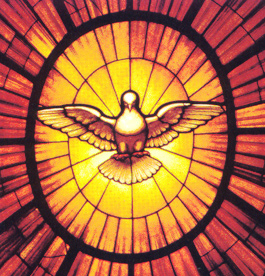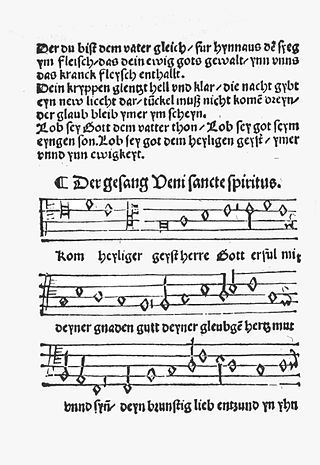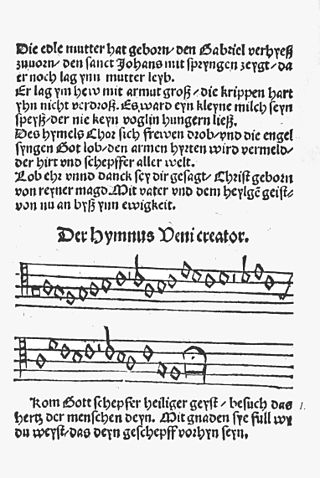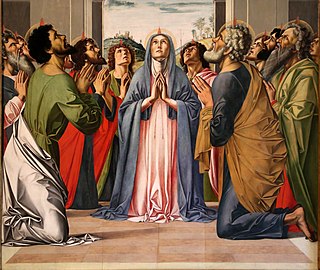
Edwin Warren Hatch was an English theologian. He is best known as the author of the book Influence of Greek Ideas and Usages Upon the Christian Church, which was based on his 1888 Hibbert Lectures and which were edited and published following his death. He is also remembered as the composer of the hymn "Breathe on Me, Breath of God."

"Christ the Lord Is Risen Today" is a Christian hymn associated with Easter. Most of the stanzas were written by Charles Wesley, and the hymn appeared under the title "Hymn for Easter Day" in Hymns and Sacred Poems by Charles and John Wesley in 1739. The hymn eventually became well known for the "Alleluia" sung as a melisma after each line, which was added by an unknown author, probably to fit the commonly used hymn tune, "Easter Hymn". It remains a traditional processional hymn on Easter Sunday.
Decisions concerning the conduct of public worship in the Church of Scotland are entirely at the discretion of the parish minister. As a result, a wide variety of musical resources are used. However, at various times in its history, the General Assembly has commissioned volumes of psalms and hymns for use by congregations.
Cwm Rhondda is a popular hymn tune written by John Hughes (1873–1932) in 1907. The name is taken from the Welsh name for the Rhondda Valley.

"Veni Sancte Spiritus", sometimes called the Golden Sequence, is a sequence prescribed in the Roman Liturgy for the Masses of Pentecost and/or its octave, exclusive of the following Sunday. It is usually attributed to either the thirteenth-century Pope Innocent III or to the Archbishop of Canterbury, Cardinal Stephen Langton, although it has been attributed to others as well.
"Veni Creator Spiritus" is a traditional Christian hymn believed to have been written by Rabanus Maurus, a ninth-century German monk, teacher, archbishop, and saint. When the original Latin text is used, it is normally sung to a Gregorian Chant tune first known from Kempten Abbey around the year 1000. The hymn has been translated and paraphrased into several languages, and adapted into many musical forms, often as a hymn for Pentecost or for other occasions that focus on the Holy Spirit.

"O come, O come, Emmanuel" is a Christian hymn for Advent, which is also often published in books of Christmas carols. The text was originally written in Latin. It is a metrical paraphrase of the O Antiphons, a series of plainchant antiphons attached to the Magnificat at Vespers over the final days before Christmas. The hymn has its origins over 1,200 years ago in monastic life in the 8th or 9th century. Seven days before Christmas Eve monasteries would sing the “O antiphons” in anticipation of Christmas Eve when the eighth antiphon, “O Virgo virginum” would be sung before and after Mary's canticle, the Magnificat. The Latin metrical form of the hymn was composed as early as the 12th century.

"Nun bitten wir den Heiligen Geist" is a German Christian hymn. The first stanza is a leise from the 13th century which alludes to the Latin sequence Veni Sancte Spiritus for Pentecost. It was widely known, and aside from its Pentecostal origin was also used as a procession song and in sacred plays.

"Komm, Heiliger Geist, Herre Gott" is a Lutheran hymn for Pentecost, with words written by Martin Luther based on "Veni Sancte Spiritus, reple tuorum corda fidelium". The hymn in three stanzas was first published in 1524. For centuries the chorale has been the prominent hymn (Hauptlied) for Pentecost in German-speaking Lutheranism. Johann Sebastian Bach used it in several chorale preludes, cantatas and his motet Der Geist hilft unser Schwachheit auf, BWV 226.

"All Creatures of Our God and King" is an English Christian hymn by William Henry Draper, based on a poem by St. Francis of Assisi. It was first published in a hymn book in 1919.

"Onward, Christian Pilgrims" is a 20th-century Christian hymn by David Wright. It was composed in 1982, is based on "Onward, Christian Soldiers", and was intended as a non-militaristic version of the earlier hymn.
"The Summons", also called "Will You Come and Follow Me", is a Scottish Christian hymn. It was written by John L. Bell in 1987.

"Komm, Gott Schöpfer, Heiliger Geist" is a Lutheran hymn for Pentecost, with words written by Martin Luther based on the Latin "Veni Creator Spiritus". The hymn in seven stanzas was first published in 1524. Its hymn tunes are Zahn No. 294, derived from the chant of the Latin hymn, and Zahn No. 295, a later transformation of that melody. The number in the current Protestant hymnal Evangelisches Gesangbuch (EG) is 126.

"O'er the Gloomy Hills of Darkness", also titled "O'er Those Gloomy Hills of Darkness", is a Welsh Christian hymn by William Williams Pantycelyn written in 1772. The hymn was written as a missionary hymn; there are conflicting accounts of why the hymn was written. The hymn was later published in 374 hymnals worldwide, though it was censored and altered in the United States by slaveholders for evangelising to slaves. The hymn later fell out of favour with hymn book editors in the 1960s.

"Lasst uns erfreuen herzlich sehr" is a hymn tune that originated from Germany in 1623, and which found widespread popularity after The English Hymnal published a 1906 version in strong triple meter with new lyrics. The triumphant melody and repeated "Alleluia" phrases have supported the tune's widespread usage during the Easter season and other festive occasions, especially with the English texts "Ye Watchers and Ye Holy Ones" and "All Creatures of Our God and King".

"Take Up Thy Cross, The Saviour Said" is an American Christian hymn written by Charles W. Everest. It was originally a poem published in 1833 but was later altered to become a hymn. It was then edited by English hymnwriter Sir Henry Baker for inclusion in the Church of England's Hymns Ancient and Modern hymnal.

"Come Down, O Love Divine" is a Christian hymn usually sung for the festival of Pentecost. It makes reference to the descent of the Holy Spirit as an invocation to God to come to into the soul of the believer. It is a popular piece of Anglican church music and is commonly sung to the tune "Down Ampney" by Ralph Vaughan Williams.
"Let us break bread together" is a traditional Christian hymn. Its melody is searching, simple, major key, and has simple lyrics.















